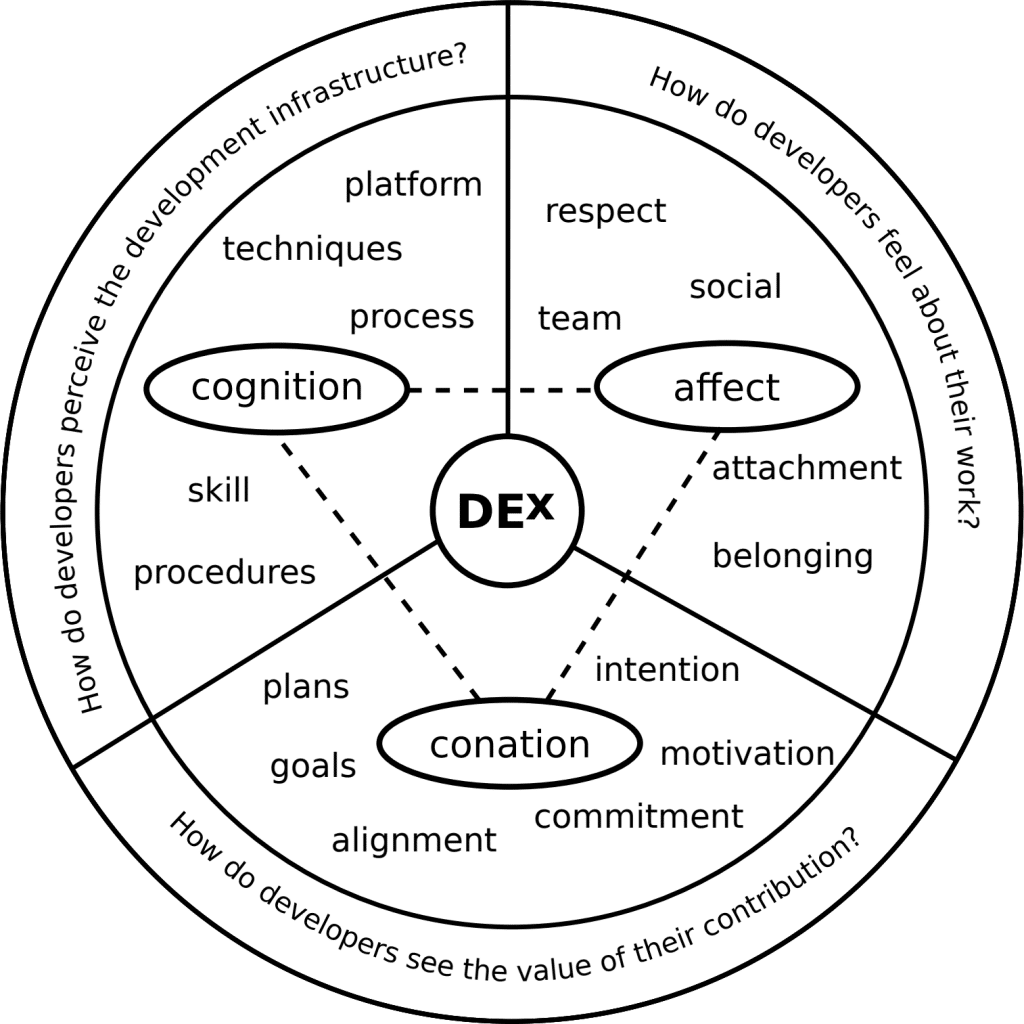Low-code, no-code, democratization. Buzzwords that frequently appear in the area of new cloud developments. After all, cloud products generally offer the opportunity for collaboration on projects, at least in technological terms - especially in comparison to traditional software development in Eclipse, Visual Studio and other IDEs. In this article, I would like to illustrate this with the model of Developer Experience (DX) using the Microsoft Power Platform as the leading Low-Code Development Platform (LCDP) underpin.
When developing software and digitizing business processes, the focus is often one-sidedly on the finished solution - either it fits or it doesn't. In the classic sense, the IT department and developers are seen as a cost centre. In the classic sense: The IT department and developers are seen as a cost center, requirements are submitted (sometimes incomprehensibly) by specialist departments and the developers develop the software with pro code, i.e. not understandable for the specialist department. More on this later. The one-sided approach often focuses (in addition to the correct functioning of the processes) on the User Experience (UX)The aim is to convey the application, product or service to users as intuitively as possible and to encourage active use in the sense of a successful user experience. Adoption to promote.
And even if developers are also users of applications, they interact in a more differentiated way with regard to development tasks. This is because during development, developers have to deal with technical artifacts that are not visible to the majority of users. However, it is precisely this side that is often not considered enough / rarely considered in today's world. The belief that a complete product is a goal should no longer exist on its own - especially in the context of low-code development! Rather, it should be the goal of every company and every enterprise to involve employees and thus as many stakeholders as possible in a development process. The result is not only an often better product, but also a lot of harmony, knowledge transfer and mutual respect. The concept of Developer Experience (DX).
While UX considers the context of use of a system, DX considers the context of software development, including aspects beyond software tools, such as development processes, modeling methods, and other means of structuring software engineering tasks.
Kuusinen, et al.
User experience (UX) focuses primarily on the benefits of the application (user-centered design) while Developer Experience (DX) focuses on the creation of an application (Product- and process-centered design).
Developer Experience (DX) as a prerequisite for successful projects
Developer Experience (DX) today represents a significant factor for the success of IT projects represent. An immature developer experience (DX) can have a negative impact on project performance. Studies show that in this case Productivity, motivation and performance of the people involved in development. Possible consequences are "shortcuts" in development processes, disregard for long-term goals, inappropriate error tolerances and disregard for safety criteria.
So how can you use Developer Experience (DX) Make measurable and increase? A model shows three main categories:
Well-being (Affect)
This category is all about the well-being of developers, their Feelings from Affiliation, RespectSocial Relationships (within a project) and the work itself.
Uniform views and the Involvement of all stakeholders (e.g. developers and end users) in a development process strengthens the sense of community. Employees from specialist departments are an integral part of the technical design of applications. This has a positive influence on mutual respect of the various interest groups.
Appreciation (Conation)
The second category examines how developers experience the appreciation of their work. This includes factors such as Motivation, Goals, Alignment and Commitment.
Innovative opportunities for collaboration on cloud-based low-code development platforms (LCDP) offer the potential to increase the developers' sense of value: they come into direct contact with the end users (e.g. specialist department) and receive direct feedback - a particularly agile approach that is not possible within the framework of classic development paradigms. The possibilities of prototyping and direct presentation and testing contribute to a higher productivity with.
Perception (Cognition)
The third category comprises the perceptions of the developers with regard to the Infrastructure and Development paradigms. Development paradigms. This includes topics such as Platform, Technology, Process and Competence.
The selection of a specific Low-Code Development Platform (LCDP) - classically the IDE - has a direct influence on Developer Experience (DX), as low-code development environments differ in their mostly proprietary technologies. Due to the low level of standardization (outside of a platform), comparability is not trivial. In addition, there are platform-specific infrastructures and development paradigms, such as Power FX at Power Apps. Assessing the perception of the work context is therefore best done directly. in the context of a specific development environment as well as global company-specific process models to be carried out.
The original model for measuring Developer Experience (DX) comes from this publication:

Measures to enhance the developer experience (DX)
In their Publication call Kuusinen and Beecham four relevant aspects to increase the Developer Experience (DX):
| Motivation factor | Requirement |
|---|---|
| Efficiency | Efficient and easy-to-use development environment (IDE) |
| Flexibility | Developer needs must be met, e.g. through customizability, scalability and extensibility according to the development and application development and delivery (AD&D) process |
| Information content | Support with relevant information, e.g. context-based when writing source code or linking and documentation with ticket systems such as Azure DevOps or JIRA |
| Intuitive Integrated Development Environment (IDE) | The development environment (IDE) must be designed intuitively and offer intelligent suggestions and functions (ideally equipped with AI) to support a solution-oriented development process |
The question of whether motivation-enhancing measures are compatible with Low-Code Development Platforms (LCDP) cannot be answered in general terms: Each LCDP pursues its own technological approacheswhich are known as Platform as a Service (PaaS) are provided. There are configuration options and extensions within the LCDP. However, these are limited by the high degree of standardization within a platform. If a company uses an LCDP, it is therefore dependent on the existing LCDP configuration options and their further developments (Vendor Lock).
Deeper insights into increasing motivation are provided by a Publication by Henriques, et al. with the title Improving the Developer Experience with a Low-Code Process Modeling Language.
In summary, I assess the Developer Experience (DX) as a great opportunityCompanies bring different people together through the same perspectives, mutual respect increases and communication and transparency increase company-wide. A space is created for employees to develop (employee expectations) and move the company forward. As the leading low-code development platform (LCDP), the Microsoft Power Platform offers important and correct foundations for implementing a developer experience (DX), which can be the starting point for so many positive changes in a company.
Questions & Answers
How can I improve the Developer Experience (DX) on the Microsoft Power Platform?
In addition to the direct benefits of low-code, cloud and Microsoft Power Platform technology (efficiency, flexibility, information content, intuitive IDE), a corporate culture that allows employees to be involved and agility to be practiced is important.
How can I successfully complete projects with the Microsoft Power Platform?
The most important element is internalizing the philosophy: low-code development platforms require an agile project approach that takes democratization and platform-specific models into account. An essential component concerns the developer experience (DX), as this is no longer only attributed to the "real" developers, but also applies to citizen developers (specialist departments).
How can Citizen Developers help in the development process?
Citizen developers (specialist departments) play a central role in the development of applications on low-code development platforms (LCDP). A unified view between development and application (through the low-code paradigm) makes this possible.


Leave a Reply